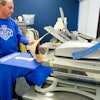As reported by Lisa Tocci
Long-awaited rules to encourage government procurement of biobased products, as required by the 2002 Farm Bill, finally have begun to emerge from the U.S. Department of Agriculture. The first group of items designated by USDA to be accorded preference in all federal purchases includes mobile equipment hydraulic fluids and penetrating lubricants. More items will be added quickly to the list in coming months, it says.The final rule, published in the March 16 Federal Register, set thresholds for the biobased content of the products and addressed comments from earlier proposals. To qualify for the preferred procurement status, the minimum biobased content for mobile equipment hydraulic fluids must be 44 percent, and for penetrating lubricants 68 percent.
Federal agencies must begin giving a procurement preference for biobased versions of these products no later than March 16, 2007, the rule says. However, the rules apply only to purchases amounting to greater than $10,000 a year for a particular type of product, and agencies do not have to comply if the costs are judged “unreasonable.”
The rulemaking defined “mobile equipment hydraulic fluids” as hydraulic fluid formulated for general use in non-stationary equipment, such as tractors and loaders, or backhoes. The minimum biobased content, 44 percent, “shall be based on the amount of qualifying biobased carbon in the product as a percent of the weight (mass) of the total organic product.”
Penetrating lubricants are defined in the rule as products formulated to provide “light lubrication and corrosion resistance in close tolerant internal and external applications, including frozen nuts and bolts, power tools, gears, valves, chains and cables.”
The Department also said that standard ASTM tests, conducted in an ASTM/ISO compliant laboratory, should be use to qualify the products claiming to meet the biobased standard. For lubricants, suggested tests include ASTM D5864, “Standard Test Method for Determining the Aerobic Aquatic Biodegradation of Lubricants or Their Components”; ASTM D6006, “Standard Guide for Assessing Biodegradability of Hydraulic Fluids”; and ASTM D6139, “Standard Test Method for Determining the Aerobic Aquatic Biodegradation of Lubricants or Their Components Using the Gledhill Shake Flask.”
In some cases, Agriculture conceded, these new guidelines may collide with earlier purchasing preferences, specifically for lubricants made with rerefined base oils. Rerefined products are covered under an EPA designation meant to encourage recycling. Where that occurs, the EPA-designated product would likely take priority over the qualifying biobased product.
USDA also made a specific exemption from the purchasing requirement for fluids used in tactical vehicles and equipment, especially until the products’ performance has been documented by the Department of Defense. So military equipment in combat or combat-related systems, where failure could have catastrophic consequences, are exempt from the obligation to purchase biobased mobile equipment hydraulic fluids, penetrating lubricants and diesel fuel additives.
Although agencies don’t have to buy biobased if the price is unreasonable, the final rule comes at a time when vegetable oil lubricants are becoming more plentiful and cost competitive, indicated Chris Toebben, a spokesman for the United Soybean Board. USB has funded development of a number of soy-based lubricants and metalworking fluid products over the years, and has seen an increasing number of lubricant industry representatives attending its meetings over the last year – especially as crude oil prices escalated, he said.
Toebben noted that soybean oil prices have been dropping again in recent months, even as crude oil and mineral base oil continue to rise. July soybean oil futures on the Chicago Board of Trade closed around 25 cents a pound yesterday, while many Group I mineral oil base stocks were more than 40 cents per pound.
As products become qualified to the new rule, USDA says it will invite manufacturers to post information on the product, contacts and performance testing on its web site. Procuring agencies will then be able to use this on-line catalog to find qualified biobased products.
The final rule also set up guidelines for procurement preferences for four other products with biobased content: roof coatings; water tank coatings; diesel fuel additives; and bedding, bed linens and towels. Information about the Federal Biobased Products Preferred Procurement Program can be found at http://www.biobased.oce.usda.gov.
Read Next























